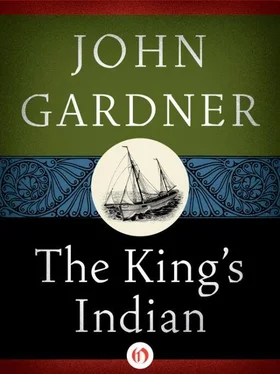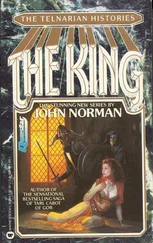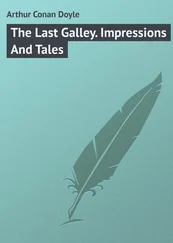“ ‘The Captain was saying in the room behind me, “As for myself, I won’t be satisfied till I’ve tracked this thing down.” “Ah, Captain,” says Mr. Knight, “ye’d better leave it rest.” But the Captain was adamant. He kept talking about it, talking about doom, despair, predestination, the inevitable fall of Assyria and Rome. The bunkum specialist kept watching him, pulling at his mustache and scowling as if any minute he’d see through to the trick in it, but the blasted insight wouldn’t come. “Think of it,” says the Captain. He was pacing, hands clasped. He seemed hardly aware of us. “Suppose it were possible that Time could loop back — suppose there were the barest shade of truth in the hocus-pocus of table-rappers, the mesmeric ‘demonstrations’ of men like Murdstone, the trickery of Swedenborg’s clairvoyants! Suppose, that is, that by somehow passing through a crack in Time a man could discover his destiny, find out the manner and place of his death. You understand what I hint. What if these two distinct paintings here are one and the same — a single painting seen from different points in Time?” “Come, come,” says one of the scientists — brown-bearded he was and as fat as a sea-cow—“we have no reason to hypothesize …”
“ ‘But the Captain’s still talking, and the bunkum man watching him, chewing on his knuckles and pulling at his mustache fit to bust. “Is the explanation more strange than any other available? But the implications, gentlemen! How could such a man help but believe that what will be must be — in other words, that all our freedom is a ludicrous illusion? The idea’s intolerable. It would drive a poor devil stark mad!” Now the bunkum specialist was pacing too, looking downright furious that he couldn’t see through it. He looked to be suspicious of everyone in the room. There was talk of a scientific expedition, but it grounded; the Society couldn’t afford it. “But a whaling voyage,” the Captain points out,”—a whaling voyage would pay for itself, and, as a kind of side interest, between good hunts …”
“ ‘Why not just quietly accept what God gives? Why worry such questions?” says Mr. Knight.
“ ‘But the Captain’s eyes was all aglint like when he lowers away (or like when he lowered away before his sickness). He nailed us with them. If he’d told me I couldn’t move my hand — that trick of the animal magnetists — I swear to heaven my hand would have turned to stone. “One of two things is true,” says he. “Either the future is predetermined, in which case, down we’ll go, as we’ve done already, or anyway as our Shadows have done — down we’ll go then and there no matter how we connive to shun those waters — or else we can escape it, even if we visit the place of our possible destruction a thousand times. It’s a place of mighty strange sights and sounds, the South Pole is; everything south of the Vanishing Isles is outside corpuscular experience. It’s made men prophets, visionaries.” Again the fat one tried to interrupt, but to no avail. “For myself,” says Dirge, “I mean to haunt those waters and know what there is to know.”
“ ‘Before you knew it, what little was left of the crew was with him, the same as in the longboat, vowing they’d get to the truth of the matter if it’s the last thing they do, which it would be, seemed to me. And there was I, mate, swearing my soul to perdition along with the best of them. Even the scientists got a little excited, even the specialist in bunkum, in spite of all he knew. Someone mentions a blind old seaman by the name of Jeremiah they’d like to see aboard. A man they say is downright uncanny. But Mr. Knight sits solemn in his polished chair and shakes his head and says, “Captain, ye’ll never get a crew in this world.” “I’ve got half a crew right here,” says Dirge. His daughter pokes her head out from the kitchen and throws a look at Mr. Knight that’d wither a crocodile. “You get yourself a full crew,” says Mr. Knight, “and I’ll be the foremost of the lot!” “And Billy More too,” shouts I, and so do some more of ‘em. “You swear to that on yer immortal souls?” We swear and swear. He makes a mighty fuss of it, and before we know it we’re shouting to the sky and drinking to damnation like maniacs—’ He stopped abruptly, grinning. ‘Aye, that was a night, lad. That was a night.’
“I believed him.
“He shook his head, looking out toward sea. ‘But oaths, they shrivel. Words, whatever their sweetness and juice, turn prunes at last, and eventually ashes. This world was never built for oaths. Time passes, ye find yerself far from the place that stirred yer nerves, and ye don’t know whether to laugh at the foolishness ye fell to before or play the madman and try to make foolishness sensible, come hell or high water, which they do.’ He monkeyed upwards, blowing out steam, swung out over on the yardarm to the next strapped stay.
“ ‘You regret yer oath, Billy?’
“ ‘I don’t think about it. Never let myself. Man of Faith, ye know. But look at Wilkins there. He wasn’t one of us, that night — he’d never sailed with Dirge before — but he knew our arrangement. All Nantucket knew. “Oaths are for maniacs and fools,” says Wilkins. The Captain never did get a crew together, took slaves instead — a desperate stratagem, to Wilkins’ way of thinking. Since the Captain cheated, the project’s off, so Wilkins claims. And Mr. Knight’s more ‘n half in agreement with him. He’d rather had a vote, cold sober, beginning with the question whether that painting was real or illusion. Either painting.…
“ ‘It’s broken the ship, all things considered.
“ ‘Or maybe this: We were ready to sail into the dragon’s mouth, slaves or no slaves, even with the Captain’s daughter on board — a thing we liked no better than the slaves. So in we sailed — and nothing happened. So we turned back to whaling, harpooning and slicing the physicality of things, for the moment putting off that stranger purpose; and we did pretty well — filled vials with oil and spermaceti — exactly as the Captain hoped we would, not guessing where his own best interest lay. Distract ‘em, that was the Captain’s thought. Keep the energy flowing! And so we returned a second time, and again nothing happened, and we turned back to whale. There were one or two who commenced to mutter about the Captain’s great purpose. It had been a long time ago now, ye know, since we’d set there like equals in the Captain’s big house. And, of course, we got less and less equal every day. The hold got richer. We all — some more, some less — took note of it. We could turn back early and collect small fortunes, especially considering that the slaves would get nothing, even less than the common seamen do when the owners and officers have lugged away their share. There got to be more talk about a hoax. Say it’s this: What we wanted was to do something BIG — make use of big energy for a big purpose, and do it fast — big speed — and do it, like Jesus Christ himself, at a mighty big cost. But the bigness drained out, that’s what happened, Johnny. The dream became merely the Captain’s dream. Our purpose changed, as purposes will, like any other thing in Nature. The big success had been too long coming, and the cost was beginning to seem absurd — our freedom to be each his own man, not cogs in a machine which is doing some job we’ve got no use for.’
“I could have asked him a number of things. I asked: ‘Ye’ve mentioned all this to the Captain?’
“He smiled, nodded sadly. ‘But the Captain’s got all the books.’
“ ‘The books?’
“ ‘Books, charts, theories — it’s all one thing. If we argue, the Captain makes fools of us. The swabs begin thinking: Then no more listening to reason, lads! Blind assertion is all. If it’s illogical, hurrah!’
Читать дальше











![John Bruce - The Lettsomian Lectures on Diseases and Disorders of the Heart and Arteries in Middle and Advanced Life [1900-1901]](/books/749387/john-bruce-the-lettsomian-lectures-on-diseases-and-disorders-of-the-heart-and-arteries-in-middle-and-advanced-life-1900-1901-thumb.webp)
